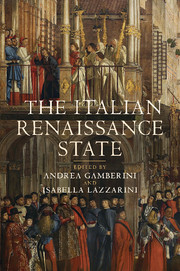Book contents
- Frontmatter
- Contents
- Notes on the contributors
- Note on translations and usage
- Map
- Introduction
- Part I The Italian states
- 1 The kingdom of Sicily
- 2 The kingdom of Naples
- 3 The kingdom of Sardinia and Corsica
- 4 The papal state
- 5 Tuscan states: Florence and Siena
- 6 Ferrara and Mantua
- 7 Venice and the Terraferma
- 8 Lombardy under the Visconti and the Sforza
- 9 The feudal principalities: the west (Monferrato, Saluzzo, Savoy and Savoy-Acaia)
- 10 The feudal principalities: the east (Trent, Bressanone/Brixen, Aquileia, Tyrol and Gorizia)
- 11 Genoa
- Part II Themes and perspectives
- Bibliography
- Index
8 - Lombardy under the Visconti and the Sforza
Published online by Cambridge University Press: 05 August 2012
- Frontmatter
- Contents
- Notes on the contributors
- Note on translations and usage
- Map
- Introduction
- Part I The Italian states
- 1 The kingdom of Sicily
- 2 The kingdom of Naples
- 3 The kingdom of Sardinia and Corsica
- 4 The papal state
- 5 Tuscan states: Florence and Siena
- 6 Ferrara and Mantua
- 7 Venice and the Terraferma
- 8 Lombardy under the Visconti and the Sforza
- 9 The feudal principalities: the west (Monferrato, Saluzzo, Savoy and Savoy-Acaia)
- 10 The feudal principalities: the east (Trent, Bressanone/Brixen, Aquileia, Tyrol and Gorizia)
- 11 Genoa
- Part II Themes and perspectives
- Bibliography
- Index
Summary
Introduction
Cautious victor, gentle orchestrator of peace. The archbishop Ottone Visconti appears thus in the Angera cycle of frescoes celebrating his victory, and that of the Milanese nobles, over the Della Torre and the Milanese pars populi, the harbinger of Ottone himself being proclaimed lord of Milan by the general council (22 January 1277). Unarmed, Ottone saves the lives of his enemies starting with his arch-rival Napo Della Torre, calms the situation and distances himself from the factious conflict to which his ascendancy was linked.
The pax of the Visconti covered Milan and its surrounding area. The events depicted in the Angera frescoes narrate an exclusively Milanese story centred around concluding and overcoming the conflict between the nobles and the populares of Milan. Some elements, however, refer to larger areas. The defeated Della Torre are taken to a prison near Como, and it is the hand of a nobleman from Pavia, ready to kill Napo Della Torre, that is stopped by Ottone. These details serve as a reminder that for a long time events in Milan had an effect on a wider scale, beyond that of the city itself. Examples can be seen in the central role of the Milanese commune in the alliances opposed to the undertakings of the emperor; in the extensive travel of the Milanese to be podestà in nearby towns; and the nature of the influence of the Della Torre, which already extended beyond the city of Milan.
- Type
- Chapter
- Information
- The Italian Renaissance State , pp. 156 - 176Publisher: Cambridge University PressPrint publication year: 2012
- 1
- Cited by



